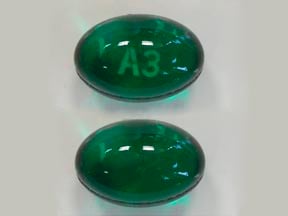
Vitamin D (ergocalciferol) Coupons & Savings Card – Discount Prices from $4.04
Vitamin D, available as ergocalciferol (D2), cholecalciferol (D3), or alfacalcidol, is a crucial fat-soluble vitamin that aids your body in absorbing calcium and phosphorus, essential for maintaining and building strong bones. It's primarily used to treat and prevent bone-related disorders like rickets and osteomalacia. Additionally, Vitamin D, often paired with calcium, is effective in preventing or treating osteoporosis, a condition that weakens bones. It also plays a role in managing low calcium or phosphate levels due to specific conditions such as hypoparathyroidism, pseudohypoparathyroidism, and familial hypophosphatemia. For individuals with kidney disease, Vitamin D helps maintain normal calcium levels and supports bone growth. Since breast milk typically contains insufficient Vitamin D, supplements, such as drops, are recommended for breastfed infants. The body naturally produces Vitamin D when the skin is exposed to sunlight; however, factors like sunscreen use, protective clothing, limited sun exposure, darker skin, and aging can reduce this natural production.
Our coupons are free to use. Before paying, show the pharmacist your Vitamin D (ergocalciferol) savings card to get your free discount. Use our filters below to edit the prescription box to match your needs. The Vitamin D (ergocalciferol) prices will update based on your prescription needs. Above our Vitamin D (ergocalciferol) coupons, you can change your location to see pharmacy prices and costs in other areas. We're here to help you buy Vitamin D (ergocalciferol) at the lowest price with our prescription discount card.
My prescription
Edit
1.25 MG(50000 UT), Ergocalciferol (12 Capsules)
Select pharmacy

CVS
$19.00
COUPON PRICE
Walmart
$4.04
COUPON PRICE
Albertsons
$9.42
COUPON PRICE
Walgreens
$10.07
COUPON PRICEVitamin D (ergocalciferol) savings card
Show this card to your pharmacist
Walmart
$4.04
BIN
ID
PCN
GRP
019876
LH91D98078
CHIPPO
LHX
Powered by
Vitamin D, available as ergocalciferol (D2), cholecalciferol (D3), or alfacalcidol, is a crucial fat-soluble vitamin that aids your body in absorbing calcium and phosphorus, essential for maintaining and building strong bones. It's primarily used to treat and prevent bone-related disorders like rickets and osteomalacia. Additionally, Vitamin D, often paired with calcium, is effective in preventing or treating osteoporosis, a condition that weakens bones. It also plays a role in managing low calcium or phosphate levels due to specific conditions such as hypoparathyroidism, pseudohypoparathyroidism, and familial hypophosphatemia. For individuals with kidney disease, Vitamin D helps maintain normal calcium levels and supports bone growth. Since breast milk typically contains insufficient Vitamin D, supplements, such as drops, are recommended for breastfed infants. The body naturally produces Vitamin D when the skin is exposed to sunlight; however, factors like sunscreen use, protective clothing, limited sun exposure, darker skin, and aging can reduce this natural production.
Our coupons are free to use. Before paying, show the pharmacist your Vitamin D (ergocalciferol) savings card to get your free discount. Use our filters below to edit the prescription box to match your needs. The Vitamin D (ergocalciferol) prices will update based on your prescription needs. Above our Vitamin D (ergocalciferol) coupons, you can change your location to see pharmacy prices and costs in other areas. We're here to help you buy Vitamin D (ergocalciferol) at the lowest price with our prescription discount card.
More prescriptions for vitamin D deficiency
coupons from$36.25Save 13%
coupons from$8.68Save 52%
coupons from$4.04Save 82%
coupons from$25.53Save 87%
coupons from$14.63Save 63%
coupons from$6.76Save 50%
More prescriptions for vitamin D deficiency
Dosoquin Save 13%coupons from $36.25
Vitamin D Save 52%coupons from $8.68
Drisdol Save 82%coupons from $4.04
Ergocalciferol Save 87%coupons from $25.53
Dosokap Save 63%coupons from $14.63
Vitamin D3 Save 50%coupons from $6.76
Vitamin D (ergocalciferol) dosage forms
Use our Vitamin D (ergocalciferol) 1.25 MG(50000 UT) coupon with prices from $10.54 for 12 Capsules. You can also use our Vitamin D (ergocalciferol) 1.25 MG(50000 UT) coupon with prices from $2.63 for 1 Capsule. We have a Vitamin D (ergocalciferol) 1.25 MG(50000 UT) coupon with prices from $2.88 for 3 Capsules. You can use our Vitamin D (ergocalciferol) 1.25 MG(50000 UT) coupon with prices from $3.01 for 4 Capsules.
Dosage Quantity Price from Per unit 1.25 MG(50000 UT) 12 Capsules $10.54 $0.88 1.25 MG(50000 UT) 1 Capsule $2.63 $2.63 1.25 MG(50000 UT) 3 Capsules $2.88 $0.96 1.25 MG(50000 UT) 4 Capsules $3.01 $0.75 1.25 MG(50000 UT) 6 Capsules $3.27 $0.55 1.25 MG(50000 UT) 8 Capsules $3.53 $0.44 1.25 MG(50000 UT) 13 Capsules $10.67 $0.82 1.25 MG(50000 UT) 15 Capsules $10.92 $0.73 1.25 MG(50000 UT) 24 Capsules $17.63 $0.73 1.25 MG(50000 UT) 26 Capsules $17.84 $0.69
| Dosage | Quantity | Price from | Per unit |
|---|---|---|---|
| 1.25 MG(50000 UT) | 12 Capsules | $10.54 | $0.88 |
| 1.25 MG(50000 UT) | 1 Capsule | $2.63 | $2.63 |
| 1.25 MG(50000 UT) | 3 Capsules | $2.88 | $0.96 |
| 1.25 MG(50000 UT) | 4 Capsules | $3.01 | $0.75 |
| 1.25 MG(50000 UT) | 6 Capsules | $3.27 | $0.55 |
| 1.25 MG(50000 UT) | 8 Capsules | $3.53 | $0.44 |
| 1.25 MG(50000 UT) | 13 Capsules | $10.67 | $0.82 |
| 1.25 MG(50000 UT) | 15 Capsules | $10.92 | $0.73 |
| 1.25 MG(50000 UT) | 24 Capsules | $17.63 | $0.73 |
| 1.25 MG(50000 UT) | 26 Capsules | $17.84 | $0.69 |
| 1.25 MG(50000 UT) | 30 Capsules | $18.28 | $0.61 |
| 1.25 MG(50000 UT) | 50 Capsules | $20.47 | $0.41 |
| 1.25 MG(50000 UT) | 90 Capsules | $24.85 | $0.28 |
| 1.25 MG(50000 UT) | 100 Capsules | $25.94 | $0.26 |
| 1.25 MG(50000 UT) | 120 Capsules | $28.13 | $0.23 |
| 1.25 MG(50000 UT) | 500 Capsules | $55.50 | $0.11 |
| 50 MCG(2000 UT) | 60 Capsules | $9.79 | $0.16 |
| 50 MCG(2000 UT) | 90 Capsules | $13.68 | $0.15 |
| 50000UNIT | 4 Capsules | $3.01 | $0.75 |
| 50000UNIT | 100 Capsules | $25.94 | $0.26 |
